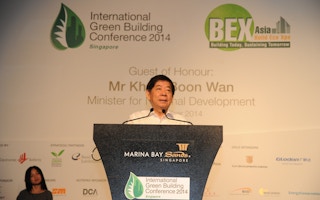Singapore’s Building and Construction Authority (BCA) on Monday unveiled a new masterplan that would guide the country’s green building strategy for the next five to 10 years.
At the centrepiece of BCA’s Third Green Building Masterplan is a new $S50 million incentive scheme for existing buildings which will support efforts by building owners and tenants from small and medium enterprises to adopt sustainable initiatives and improve the energy efficiency of their premises.
National Development Minister Khaw Boon Wan launched the new Masterplan at the opening ceremony of the annual International Green Building Conference (IGBC) held at the Marina Bay Sands Expo and Convention Centre.
The incentive scheme will co-fund a maximum of half of the cost of retrofitting buildings for energy improvements, or sums of up to S$3 million for building owners and S$20,000 for individual occupants and tenants.
This masterplan is the latest in BCA’s decade-long effort to introduce several policies and initiatives to promote energy efficiency and sustainable construction practices within the building sector. Their results have paid off, with the number of green buildings having grown from 17 in 2005 to 2,100 today – this is equivalent to a quarter of Singapore’s total gross built up area.
“We are on track to achieve our target to green 80 per cent of our building stock by 2030,” said Khaw.
Khaw also announced two other major initiatives as part of this masterplan, the first of which was a $52 million fund for the Green Buildings Innovation Cluster that will support the development and testing of green building solutions specially tailored to tropical climates.
“We hope the cluster will help experts and the industry, both locally and from the region, to come together to share knowledge and work together on solutions to improve energy efficiency,” said Khaw, adding that solutions needed to be moved from laboratories to real world situations more quickly.
He also announced the introduction of a new ‘Pearl’ award category into the Green Mark, Singapore’s national green building certification scheme. This category recognises developers and building owners who have actively engaged their tenants to reduce energy consumption through changes in their behaviour and operations.
“
As the population in Singapore increases, more focused policies and measures are needed to foster greater awareness amongst tenants and occupants. By proactively changing their energy consumption behaviour and practices, tenants and occupants can be part of the solution rather than the problem.
John Keung, chief executive officer, Building and Construction Authority
Khaw noted that these initiatives under the third Green Building Masterplan took “Singapore’s greening efforts beyond the building structures and hardware to focus more on end-users.” This is a clear change in direction after the inaugural Green Building Masterplan, launched in 2006, focused on new buildings, while the second edition launched in 2009 also looked at hardware issues in existing buildings.
John Keung, chief executive of BCA, added that “as the population in Singapore increases, more focused policies and measures are needed to foster greater awareness amongst tenants and occupants.”
“By proactively changing their energy consumption behaviour and practices, tenants and occupants can be part of the solution rather than the problem,” he noted.
The new Masterplan will also require the public sector to serve as exemplary adopters of green building practices. For example, it will be mandatory for all existing public sector buildings with an area of more than 5,000 square metres to achieve Green Mark certification, and for all office spaces to be leased from buildings with high Green Mark ratings. Government events and functions will also have to be held in Green Mark certified venues.
BCA noted that the initiatives under the Masterplan would induce green growth, attract investors and profile Singapore’s services and expertise on green building solutions for the tropics on an international stage. To share this expertise, BCA signed three agreements to exchange expertise and best practices and conduct joint training and seminar events with Sri Lanka’s Ceylon Institute of Builders, the Tanzanian National Housing Corporation, and the National Association of Indonesian Consultants.
BCA also released the inaugural Building Energy Benchmarking Report (BEBR) at the opening ceremony, which follows up on legislation that was passed in 2012 requiring existing buildings to submit energy consumption information to BCA.
The report provided statistics on energy performance to spur building owners to reduce their own energy consumption, and also confirmed that Singapore’s commercial buildings had become more energy efficient in the past five years.
Commercial buildings with the Green Mark certifications were also more energy efficient that those without the certification, a fact that Khaw said was “reassuring.”
“Climate change and greater urbanisation are here to stay and affect us all,” said Khaw. “Government, business, community groups, and individuals all have a part to play to address these challenges.”
Our special event coverage of the International Green Building Conference 2014 is brought to you by City Developments Limited (CDL).






















